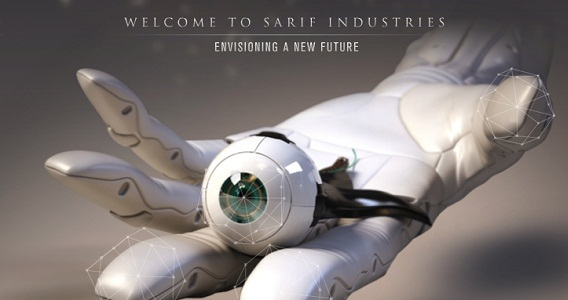
Deus Ex: Human Revolution is in the wild, and if you familiarized yourself with my review, you know I had a few words about the narrative and what it offered me. Since then, and in light of some of the opinions that have since filtered onto the Internet, I’ve felt that line of thought deserved an even greater number of words.
It’s been suggested that Deus Ex doesn’t have a story, but merely a plot; that is to say, it is a piece driven by events, not characters, whereby the actors within contribute little to the proceedings. This is a common enough ailment in the circumstance-driven videogame medium, and maybe even a reasonable assessment of Deus Ex, but perhaps not a fair criticism.
It’s curious to me that Deus Ex is the title to elicit this response among some far more serious offenders; perhaps it is that the title makes so much of its story that any supposed deficiency is more vividly felt. The condition is most apparent in the main character of Adam Jensen, a man who has no character arc, and indeed, little emotion about, opinion of, or even response to the whirlwind of events that encircles him.
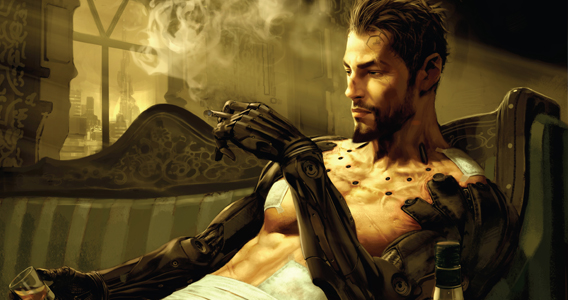
In some titles, this could be damning—but at the same time, many a videogame has made its name on a silent, unknowable protagonist (though few with the narrative weight employed in Deus Ex). It could be argued that Adam is incidental in his own immense story; that his ideas don’t matter, that his values don’t inform the narrative—and it would be easy to feel that this diminishes the tale, but what’s done here is deliberate, serving the true imperative of Human Revolution: which is not, I contend, to tell a story.
Adam Jensen, save for a few optional dialogue choices, does not express particular opinions, illustrate emotional states, or experience a character arc. He is largely a blank slate, and accordingly, Human Revolution is not a game where the player is meant to sit back and be told his story. It is, despite all appearances, not the tale of Adam Jensen.
It is instead a question asked of the player.
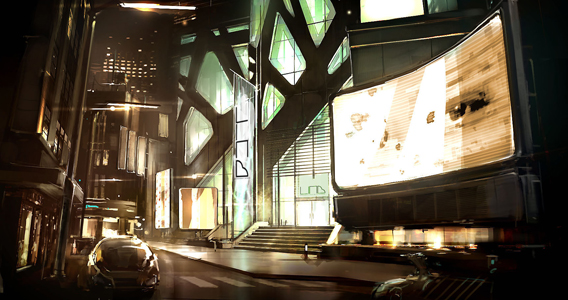
Consider, for a moment, supporting character David Sarif: a visionary, he is at heart a man who seeks to elevate humanity and improve quality of life the globe over—but he’s also single-minded and dangerously irresponsible. He refuses oversight, regulation, or any middle-path for fear that his goals might be squashed in the process.
He is fervently dedicated to his belief in improving humanity, and unsettlingly dismissive of alternative views—such that, when the opportunity arises, he saddles the player character with a wealth of unnecessary augmentations, even going so far as electively replacing Adam Jensen’s legs. His assumption is simply that he has done Adam a favor.
In another game, the story might see the character embrace or reject this gift—and, consequently, the friendship of David Sarif. Adam, though, offers no response, neither to embrace nor reject—rather, he simply absorbs this knowledge, requiring the player to gauge these actions on an ethical scale, and perhaps inform the decision that comes later.
Adam exists to observe ideas, information, and arguments; he exists as a bridge through which these notions can be brought to the player and considered. He is a lens, and his focus is brought down upon supporting players who are not truly characters themselves—actors that do not have a story so much as they have a nature and an argument that they exist to communicate.
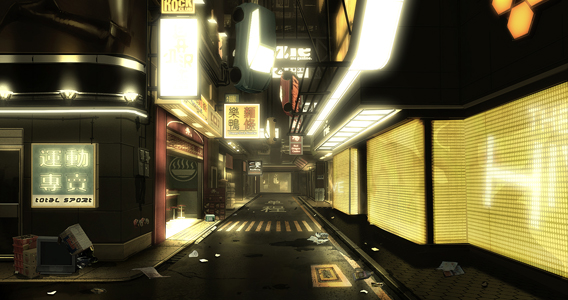
For the vast majority of the game, the player can do little to effect change or make character-driven choices of the variety that have made Mass Effect (and to a lesser degree, Infamous) successful. Indeed, Adam is not in a position where he has many choices to make. He and the player are on a ride, and when the ride comes to a stop, that is when the motives, the knowledge, and the ethics of what Adam has seen and experienced come in to play.
The final choice of Deus Ex isn’t about choosing what reflects Adam’s opinions or personality—because he has expressed little. His ethics are unknown, his ideals are immaterial—he is made up of only the information that he has observed, and the conclusions the player draws for him.
This feels distinctly earnest, because no matter what ideals we may hold, our decisions materialize in moments, and they are the measure of our emotions, of our information and our ability to analyze it.
We may believe in helping the poor, but we may choose not to give our change to the man on the street—perhaps simply because we are less selfless in practice, but perhaps because we recognize the imperfect nature of our reality and question how our change might be put to use.
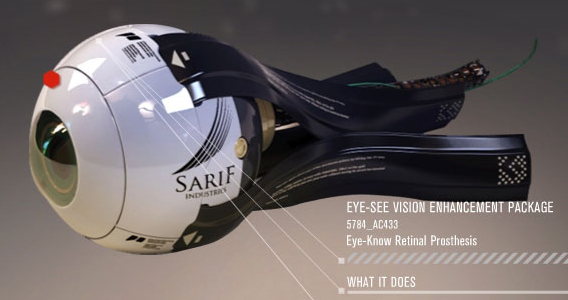
We don’t have character sheets to follow. We aren’t necessarily logically consistent; not because we make our ideals up on the fly, but because our ideals are cumulative. They evolve according to our experience. We don’t follow a morality scale where we always choose the red path or always the blue path, or even where we would make the same choice twice. If such paths existed, perhaps we would follow—but the nature of right and wrong is such that we must identify them for ourselves, and this is done on an endlessly revised personal scale.
When Adam arrives at the decision that will shape the world, he has no opinion, no red options or blue options to help the player decide what to do. It would be simple to hold the player’s hand and show him what is right; to paint David Sarif as the dangerous corporate villain, or William Taggart as the control-mad manipulator, but neither is wholly the truth—and far more importantly, knowing the villain of the piece would not reveal any truth to inform one’s moral choices.
I found an opponent who I felt was evil, whose goals I could not abide—but the choice that would see me side with him still held its allure, its complex and uncomfortable rational practicality, and its own discrete morality.

Few questions are as difficult as what is right, with perhaps the only more demanding being how to enforce what is right. Even those who believe in a perfect, divine morality etched onto the face of the universe know this dilemma, and that is the question of Human Revolution. If there is no red or blue path to guide you, what do you believe, and what will you compromise? What sin is allowable for what end? There is a fundamental truth there; that morality is not an absolute to which we adhere, but something we must continually build and reason out.
That’s where the strength of Human Revolution’s narrative lies. It is not a story to be told, but a dilemma to be presented, to be drawn out in sharp detail for forty hours—presented for the player’s ultimate consideration, rather than mere entertainment. It is an achievement for a genre that more often presents simplistic ideas of heroism or villainy, trite imitations of moral quandaries and thin simulations of the nature of decision making.
Or, more simply: Deus Ex: Human Revolution is the only game where, after making such a choice, I still wasn’t certain I had done the right thing—and the quality of my entertainment was significantly improved by such genuine conflict.